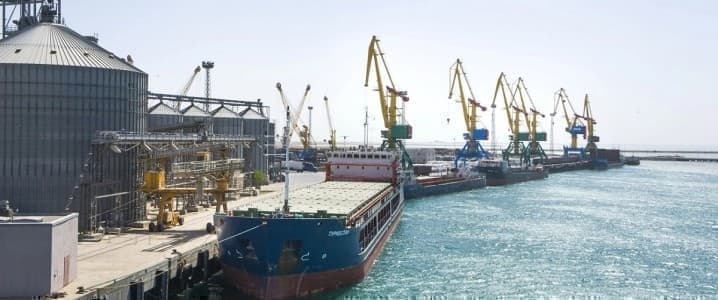
Kazakhstan has in a fresh effort to ease bottlenecks in a transportation corridor bypassing Russia reached an understanding with Azerbaijan and Georgia to set up a jointly run and owned logistics company.
The agreement was signed last week at the culmination of a trip to the South Caucasus nations by Kazakh Prime Minister Alikhan Smailov.
The goal behind establishing the company will be to simplify the process of handling cargo transportation between China and Europe and to streamline the tariff process.
Pessimistic analyses on the prospects of the Trans-Caspian International Transport Route, or the Middle Corridor, as it is also known, often cite the fact that cargo is required to cross multiple national borders. The Azerbaijani-Georgian-Kazakh logistics company is envisioned as a way of overcoming that hurdle.
Considerable progress has been made on easing the passage of goods already.
Kazakhstan’s Industry and Infrastructure Development Ministry has reported that delivery times for goods being carried from China to Europe across the trans-Caspian route have decreased over the past year from 53 days to just 18-23 days. The goal is to bring that down even further, to 10-15 days.
While the physical volume of goods is relatively modest, the trend is positive. The amount of cargo traffic by weight carried along the route from the beginning of the year through to June exceeded 1 million tons, an increase of 64 percent compared to the same period last year.
But while delivery times can be brought down through efficient coordination, volumes cannot be increased without investment in new infrastructure.
As Gaidar Abdikerimov, the secretary-general of the association of the Trans-Caspian International Transport Route, has explained to Eurasianet, the bottleneck most plaguing the Caspian’s transit potential is the South Caucasus. Underdeveloped port infrastructure limits capacity and causes congestion, he has said.
Georgian Prime Minister Irakli Garibashvili acknowledged this problem during his meeting with Smailov.
“We are cooperating to eliminate bottlenecks on the route and make the Middle Corridor even more attractive for the countries of Central Asia, China and other Asian countries in general,” Garibashvili said.
He also said that the Georgian authorities are working on the modernization of the railway network and the construction of a new port.
Smailov’s tour produced much other business in connectivity besides. One of the 10 bilateral agreements he signed with Azerbaijan will see the number of permitted flights between the two countries rise from a maximum of 32 per week to 42.
Astana says its goal is to ramp up exports to Azerbaijan so as to reach $1 billion in bilateral trade, up from the $500 million recorded in 2022.
Among the agreements concluded in Georgia was one on increasing capacity at the Batumi oil terminal, which belongs to Kazakhstan and provides Kazakh oil with an outlet to the Black Sea market. This corridor is seen as a particularly important component of Kazakhstan’s strategy to reduce its reliance on Russian territory for export of its oil.